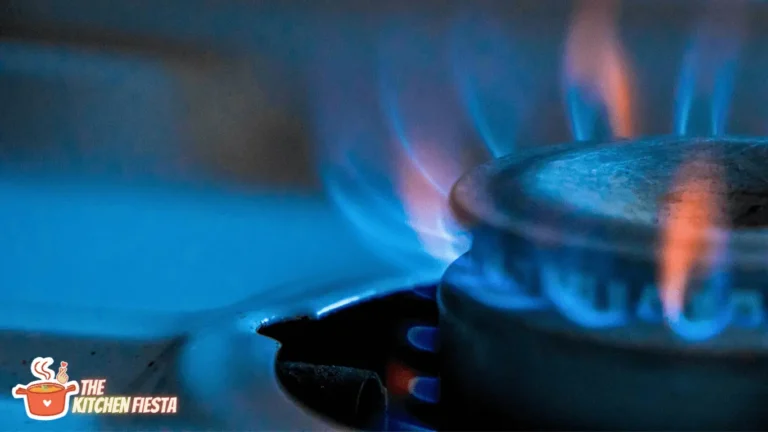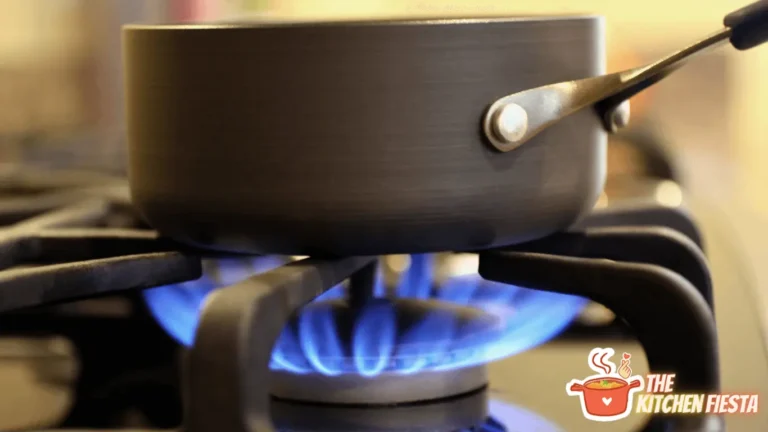Accidentally Left Gas Stove On Without Flame Overnight: What To Do Now

Leaving a gas stove on without a flame overnight can be a common mistake many people make. It can happen to anyone, and the consequences can be severe. Gas stoves run on natural gas, meaning an underground gas line runs directly to your house to provide the ignition source for your stove. If left on without a flame, gas can fill your home, creating a dangerous situation.
The dangers of leaving a gas stove without a flame overnight are significant. Gas is highly flammable and can ignite with just a spark. This can cause fires, explosions, and even carbon monoxide poisoning. Carbon monoxide is a colorless, odorless gas that can be deadly if inhaled in large amounts. It is essential to know what to do if you accidentally leave your gas stove on without a flame overnight to prevent any potential hazards.
This article will discuss what to do if you accidentally leave your gas stove on without a flame overnight. We will provide you with essential information on how to prevent gas leaks, what to do if you smell gas, and how to ventilate your home correctly. We will also review some safety tips to keep in mind when using gas stoves to avoid any potential dangers.
Gas Stoves 101
Gas Stove Basics
Gas stoves are common household appliances that use natural gas or propane to cook food. They work by igniting a flame that heats up the burners or ovens. Gas stoves are popular because they heat up quickly and provide precise temperature control. Many professional chefs also prefer them because they allow for more even cooking.
Gas stoves have different types of burners, including open and sealed. Open burners have a visible and exposed flame, while sealed burners have a cover that protects the flame from spills and other debris.
Safety Features
Gas stoves have several safety features designed to prevent accidents and ensure they are used safely. Some of these features include:
- Automatic shut-off valves: These valves automatically turn off the gas supply if the flame goes out. This prevents gas from leaking into the room, which can be dangerous.
- Flame failure devices: These devices detect when the flame has gone out and automatically shut off the gas supply. This critical safety feature prevents gas from leaking into the room.
- Ventilation: Gas stoves must be properly ventilated to prevent carbon monoxide buildup. Carbon monoxide is a colorless, odorless gas that is produced when gas is burned. It can be deadly if it builds up in an enclosed space.
- Child safety locks: Some gas stoves have locks that prevent children from accidentally turning on the stove.
It is essential to follow the manufacturer’s instructions when using a gas stove and keep it in sight. If you smell gas or suspect a gas leak, leave the area immediately and call the gas company or fire department.
Risks of Leaving Gas Stove On Without Flame
Leaving a gas stove on without a flame can be dangerous. It is important to understand the potential risks associated with this mistake to prevent any accidents from happening.
1. Gas Leak
One of the most significant risks of leaving a gas stove on without a flame is the potential for a gas leak. If the gas is left on for an extended period, it can escape into the air and create a dangerous situation. Natural gas is highly flammable and can ignite with just a spark, causing an explosion or fire.
2. Carbon Monoxide Poisoning
Carbon monoxide poisoning is another risk associated with leaving a gas stove without a flame. Carbon monoxide is an odorless and colorless gas produced when natural gas does not burn completely. This gas can build up in an enclosed space, leading to headaches, dizziness, nausea, and even death.
3. Fire Hazard
Leaving a gas stove on without a flame can also create a fire hazard. If there is any flammable material near the stove, such as paper or cloth, it can ignite and cause a fire. This can quickly spread and cause significant damage to the surrounding area.
It is crucial to double-check that the gas stove is turned off after use to prevent any of these risks. If you suspect that there may be a gas leak, it is essential to evacuate the area immediately and call a professional to address the issue.
Immediate Actions to Take
If you accidentally left your gas stove on without a flame overnight, there are a few immediate actions you should take to ensure your safety and the safety of others in your household.
1. Ventilation
First, you should open all the windows and doors in your house to allow fresh air to circulate. This will help to eliminate gas fumes and reduce the risk of respiratory problems. Remember that gas fumes can be harmful, so it is essential to ventilate the area as soon as possible.
2. Gas Supply Cut Off
Turn off the gas supply when you notice the gas stove has been left on without a flame overnight. Find the gas valve and turn it off. If you cannot locate the gas valve, call your gas company, and they will shut it off. This will help to prevent any further gas from leaking into your home.
3. Professional Inspection
After taking the immediate actions mentioned above, it is essential to have a professional inspect your gas stove to ensure that it is safe to use again. A professional can check for any gas leaks or damage to the stove that may have occurred while it was left on without a flame.
It is important to note that gas leaks can be hazardous and should be taken seriously. If you suspect a gas leak, evacuate your home immediately and call 911.
Preventative Measures
Preventing accidents caused by leaving a gas stove on without a flame overnight requires regular maintenance, safety devices, and cautious usage. Here are some preventative measures that can help avoid such accidents.
Regular Maintenance
Regular maintenance of gas stoves is essential to ensure they are working correctly. A professional should inspect the stove at least once a year to check for gas leaks and other issues that may cause accidents. Regular cleaning of the stove and its components is also necessary to prevent the buildup of grease and other flammable substances.
Safety Devices
Installing safety devices can help prevent accidents caused by leaving a gas stove on without a flame. One such device is a gas detector that can detect gas leaks and alert the user with an alarm. Another device is a stove timer that automatically turns off the stove after a set period. These devices can provide an added layer of safety and peace of mind.
Cautious Usage
Cautious usage is the most critical preventative measure. Users should always double-check that the stove is turned off before leaving the kitchen or going to bed. They should also avoid leaving flammable materials near the stove and ensure that the stove is placed on a stable surface. Additionally, users should never use the stove as a heat source and avoid using it when tired or under drugs or alcohol.
By following these preventative measures, users can significantly reduce the risk of accidents caused by leaving a gas stove on without a flame overnight.
Conclusion
In conclusion, leaving a gas stove on without a flame overnight can be dangerous. The risk of gas leaks and explosions is significant, and it is essential to take immediate action if such a mistake is made.
The first step in addressing the situation is to turn off the gas at the source. If the gas shut-off valve cannot be reached, contacting the gas company to shut it off is the next best option. It is also important to open windows and doors to ventilate the area and avoid using electrical equipment or lighting matches until the gas dissipates.
Preventing such mistakes from happening in the future is crucial. One way to do this is by making it a habit to check the stove and all other gas appliances before leaving the house or going to bed. Installing a gas detector can also provide an added layer of safety and alert homeowners to any potential gas leaks.
Overall, while accidentally leaving a gas stove on without a flame overnight can be a severe mistake, taking prompt action and implementing preventative measures can help ensure the safety of one’s home and family.
Frequently Asked Questions
What are the dangers of leaving a gas stove on without a flame?
Leaving a gas stove on without a flame can be extremely dangerous. It can cause carbon monoxide poisoning, a colorless and odorless gas that can cause dizziness, headaches, nausea, and even death. It can also lead to a fire hazard, as gas leaks can ignite and cause a fire.
How long can a gas stove be left on without a flame?
It is not recommended to leave a gas stove on without a flame for any time. Even leaving it on for a few minutes can be dangerous. It is best to turn off the stove immediately if the flame has gone out.
What should I do if I accidentally leave my gas stove on without a flame?
If you accidentally leave your gas stove on without a flame, you should first turn off the stove or burner to prevent the problem from continuing. Then, open windows and doors to air out the room. If you smell gas, evacuate everyone on the property, including pets, and call your gas company or the fire department from a safe location.
Is it safe to sleep in a house with a gas stove left on without a flame?
Sleeping in a house with a gas stove left on without a flame is unsafe. Carbon monoxide poisoning can occur while sleeping, and it can be fatal. Turning off the stove immediately and airing the room before sleeping is essential.
How long does it take to air out a house after leaving a gas stove without a flame?
The amount of time it takes to air out a house after leaving a gas stove on without a flame depends on the size of the room and the amount of ventilation. It is recommended to open windows and doors and use fans to help circulate the air. It may take several hours or even a day to air the room completely.
What are the risks of leaving a gas stove on overnight?
Leaving a gas stove on overnight can be extremely dangerous. It can cause carbon monoxide poisoning, which can be fatal. It can also lead to a fire hazard, as gas leaks can ignite and cause a fire. It is vital to permanently turn off the stove before going to bed.






